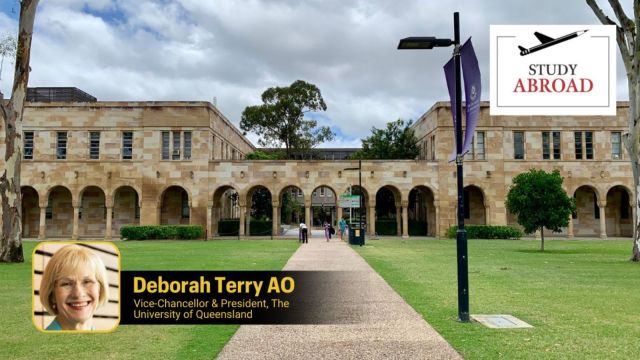Australian universities have been in the news recently as a few are opening campuses in India and also due to the job and accommodation crisis that international students are facing. At such a time, Deborah Terry AO, Vice-Chancellor and President, The University of Queensland talks to indianexpress.com about why Indian students should choose Australia as their study destination.

At a time when there are reports of accommodation and job issues in Australia, why should an Indian student enroll at the University of Queensland?
Deborah Terry: Indian students at the University of Queensland have access to robust support services, diverse student clubs, and opportunities for postgraduate studies, including PhD programmes. Additionally, the university ensures that they have accommodation options that suit their preferences and budgets, which may include on-campus choices like residential colleges and self-catered housing. Private providers also collaborate with the university to offer a variety of accommodation options for international students.
What career prospects are available for international students graduating from the University of Queensland, and how does the university support structured learning, global mobility, and access to career opportunities, including the presence of a dedicated placement cell?
Deborah Terry: Graduates of the University of Queensland can anticipate strong career opportunities due to the university’s global recognition and accredited courses, leading to high employment rates for its alumni. UQ’s 311,000 graduates are an engaged network of global alumni spanning 184 countries and include more than 17,000 PhDs. According to the 2022 Quality Indicators for Learning and Teaching Graduate Outcomes Survey, 81 per cent of UQ Australian bachelor’s degree graduates available for full-time work had secured full-time employment within four months of completing programmes, comparing favourably to the national average of 78.5 per cent.
The university prioritises structured learning, which is essential in numerous professional fields, and provides chances for global experiences through initiatives like the New Colombo Plan, which offers valuable international exposure.
Additionally, the University of Queensland offers dedicated career and graduate education services through the Office of Graduate Education. They also facilitate skill development and networking opportunities through various programmes, clubs, and societies, which have engaged more than 30,000 students over the past 23 years.
Story continues below this ad
Do the programmes and opportunities mentioned, including the recent initiative of inviting foreign universities to India, apply to both domestic and international students at the University of Queensland, and what advice does the university have for Indian students considering higher education in Australia?
Deborah Terry: Certainly, the programmes and opportunities are open to both domestic and international students at the University of Queensland. While the university typically does not establish campuses abroad, our approach in India involves forming partnerships with institutions such as IIT Delhi and other avenues for Indian students to study at the University of Queensland.
For Indian students seeking higher education in Australia, the university recommends meeting standard admission requirements, which include prerequisites and English language proficiency. They place significant emphasis on experiential learning, soft skill development, active engagement with course material, teamwork, and vibrant discussions. Students are encouraged to seize leadership opportunities, engage in global experiences, participate in research, and undertake innovative projects to bolster their soft skills.
What guidance does the University of Queensland offer to Indian students seeking to enhance their soft skills before embarking on their studies in Australia?
Story continues below this ad
Deborah Terry: The University of Queensland advises students to enhance their soft skills by taking on leadership roles, engaging in global experiences, contributing to research projects, and participating in innovative endeavours, including startups. Their approach underscores the importance of a comprehensive education that blends deep knowledge in their chosen field with the development of a diverse skill set. This approach is designed to equip students with the adaptability and lifelong learning skills necessary to meet the changing demands of the future job market.
What are some popular courses among Indian students at the University of Queensland?
Deborah Terry: The two largest faculties at UQ for Indian student enrolments are 1) Science and 2) Engineering, Architecture and Information Technology (EAIT). STEM programmes account for some of the most popular programs for Indian student enrolments in the 2018-2023 period: Master of Business (250 students), Master of Food Science and Technology (150), Master of Biotechnology (126), and Bachelor of Engineering (101).
The most popular research areas of UQ-India co-publications are also STEM-related subjects. In the 2018-2023 period, there are 127 Astronomy and Astrophysics co-publications, followed by Plant Sciences (99), Agronomy (70), Materials Science (70), Environmental Sciences (65), Chemistry (57), and Energy and Fuels (57).
Story continues below this ad
Could you provide details about the Queensland High Achievers scholarship, and its advantages for international students?
Deborah Terry: The Queensland High Achievers scholarship, aimed at high-achieving international students, covers 20 per cent of the total course tuition fees and applies to most full-time programmes at the University of Queensland. To qualify, applicants must meet the university’s admission requirements.
Additionally, the University of Queensland provides other scholarship opportunities tied to institutional partnerships and philanthropic programmes. There are also international scholarships available for PhD students, though eligibility criteria may vary for these programmes.
What measures and support services does the University of Queensland offer to assist international students in adapting to the local culture, managing mental health challenges, and finding part-time work to sustain themselves during their studies?
Story continues below this ad
Deborah Terry: The University of Queensland provides comprehensive support to international students, which includes counselling programmes and encourages engagement in clubs, societies, and interest groups, fostering an inclusive environment for interaction, learning, and building relationships between international and domestic students. They are also committed to addressing mental health challenges and help. Additionally, UQ offers a wide range of services that support international students before and after they commence at UQ. New students are encouraged to drop into the International Arrival Lounge at the start of semesters, and to attend events, sessions, and expos dedicated to international students. It’s a great way to make friends and share experiences.
Regarding part-time employment, the university assists international students in finding opportunities, considering that they are allowed to work up to 20 hours per week under their visa terms. The university also employs students in various roles and is actively working to expand these programmes. However, students need to strike a balance between work and studies to ensure their academic performance remains uncompromised, and the university supports students in achieving this equilibrium.

































